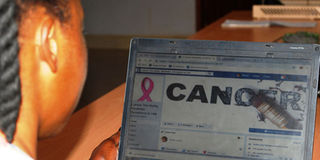Cancer phobia: Seek right information

Knowledge. A lady seeks information about cancer on internet. PHOTO BY RACHEL MABALA
What you need to know:
- Creating awareness. Daily Monitor is this month running stories on cancer to empathise with those affected, celebrate with those who have beaten the scourge and also create awareness. Today, Moses Muwulya shares tips on how one can avoid fear of cancer.
It is close to two years, since Alice Namaganda and her family chose to cease eating groundnuts processed by grinding machines.
Together with her spouse, the mother of three, a resident of Nyendo in Masaka Town, took the decision after they heard that such groundnut paste causes cancer and in particular of the intestinal kind.
“We heard that as such machines grind, they wear off some small particles. So, where do these particles go? Definitely in the groundnut paste and we end up taking them thus getting intestinal cancer,” she reasons.
Jessica Namugenyi’s spouse directed her not to put lipstick anymore because, “he had heard that such cosmetics may cause cancer, and he is not willing to stay a widower when I succumb to it”.
As cancer continues to rob us of our loved ones, myth after myth on the causes, treatment and diagnosis of cancer come up every day.
Even without getting any verification, these myths are taken as truth, causing panic, anxiety and fear of contracting the disease, which is largely treated as a “password to death”.
Known as carcinophobia, cancer phobia is an anxiety disorder characterised by the chronic fear of developing cancer. It can manifest in tremendous feelings of sadness, fear, panic and distress.
Although there is little research on cancer phobia worldwide and specifically in Uganda, Dr Noleb Mugisha, the head of the Comprehensive Community Cancer Programme at Uganda Cancer institute (UCI), says it exists and it is something they are yet to study.
He says there are people who come at the UCI for screening after fearing that they have cancer.
“Even without having notable signs. Others go an extra mile and stop eating certain foods claiming they were said to cause cancer,” he says.
Dr Paul Nyende, a psychologist from Department of Mental Health and Community Psychology at Makerere University, explains that such irrational anxiety can cause spouses to get angry at their spouses for bringing such foods home.
“Others may start fearing any physical symptom such as coughing, sweating and a rapid heartbeat, spending lots and lots of money on simple ailments like cough,” Dr Nyende shares.
While cancer phobia may not be severe for someone who only thinks or hears these myths, people who have lost their loved ones to the disease suffer the bulk of it.
After seeing her granddaughter braving retinoblastoma cancer (eye cancer), Ms Margret Nambooze shares that what remains of the experience is the pinch of cancer phobia.
“I sometimes consider myself having cancer and then start imagining the pain I am destined to go through because the vivid memories of the pain my granddaughter braved still linger in my mind,” she says.
For example when she developed a pimple on her chick, she was quick to test it for cancer.
Joan, not real names, whose mother is battling throat cancer, heard that cancer is hereditary.
“So my worry is to develop it and sometimes I feel the pain in my mind and where the money will come from, then it gets worse,” she says.
But Dr Mugisha explains that not all cancers are hereditary:
He says: “Cancer types which are caused by hereditary gene mutation include prostate cancer in men, cervical and breast cancer in women.”
While such anxiety may be good, as this may spur vigilance which may see someone go for early screening, Dr Mugisha says it is damaging when it gets extreme and a victim is advised to seek treatment.
Dr Nyende explains that a therapist needs to provide tranquilisers to slow down the anxiety, and when it is extreme; one can get depressed, which may call for antidepressant drugs.
He says: “Therapists need to deal with the recognition of an individual’s thinking and restore rational thinking.”
But he stresses that there is poor perception towards seeing therapists:
“People think that this is a Western concept which just consumes money,” he says.
However, he warns that such anxieties are dangerous because a cancer free person may end up with irrational anxiety which may affect the immune system, opening up avenues for other disease such as high blood pressure.
Dr Nyende warns that it is not good to depend on whatever is said about cancer as this tends to be exaggerated, triggering irrational anxiety.
“Because people get information from research which may be made elsewhere, and may not even apply in Uganda. Sometimes these reports go beyond what is on the ground, and get space in mainstream media,” Dr Nyende stresses.
For most types of cancer, a biopsy is the main way doctors diagnose cancer where a small amount of tissue is removed and examined under a microscope.
Uganda Women’s Cancer Support Organisation chief executive officer Gertrude Nakigudde says the huge mystery about cancer continues to put people in fear which sometimes may be uncalled for.
“Some do not even know how cancer is screened and treated. All they know is cancer is a deadly disease,” she says.
Where to find help
UMC Victoria Hospital: Free breast cancer screening at the hospital and UMC Entebbe clinic, free specialist/ doctor consultation and discount on extra investigations such as ultra-sound /biopsy if required.
Nakasero Hospital: Breast cancer awareness presentation twice every week for October, free clinical breast examination following the presentation, free mammography services following the breast exam for those that require it and all the above will require booking to ensure good planning for each day.
AAR: All AAR clinics (Makerere Health Centre, Bweyogerere Health Centre, Bweyogerere Health Centre – annex, Kabalagala Health Centre, Bugolobi Health Centre, City Health Centre, Entebbe clinic, Ntinda Health Centre, Acacia Health Centre, Mukono Health Centre, Natete Health Centre and Gulu Health Centre) will provide free breast cancer examination and V/A screening at a subsidised price of Shs10,000.
Myths debunked
Mr Alfred Jatho, a health educator and public health specialist at Uganda Cancer Institute, under the Comprehensive Community Cancer Programme, which is charged with community cancer education, lists some of the commonest myths and misconceptions about cancer.
It cannot be cured. No, if detected early, cancer can be cured.
Antiperspirants or deodorants cause breast cancer. No. The best studies so far have found no evidence linking the chemicals typically found in antiperspirants and deodorants with changes in breast tissue.
Family planning methods like implants cause breast cancer. No. There is no proof yet; Breast cancer is not caused by family planning methods like implants.
Cervical Cancer is caused by poor female hygiene or by using sanitary pads more than once. No. Cervical cancer is caused by infection with HPV. The cancer has nothing to do with vaginal hygiene or sanitary pads.
Cancer screening tests are painful. Part of a woman’s cervix or womb removed during screening. No, Screening tests are painless, though you may feel a little uncomfortable during a pelvic examination. No part of the cervix or womb is removed during screening.
Are the HPV vaccines safe and effective? Yes. Many studies conducted in developing and developed countries have found both vaccines to be very safe and effective. Both vaccines have been given to millions of girls and women around the world without serious effect.
Will HPV vaccination affect my daughter’s fertility? Will it be more difficult for her to become pregnant? No. There is no evidence that HPV vaccination will affect a girl’s future fertility or cause any problems.
High levels of sexual activity or frequent ejaculation cause prostate cancer. This is not true. In fact, some studies show that men who report more frequent ejaculations may have a lower risk of developing prostate cancer.
Prostate enlargement means prostate cancer. This is not true. Apart from prostate cancer, there are other conditions that present with symptoms similar to that of prostate cancer.
A man will develop prostate cancer only if his father had prostate cancer. Not exactly, but if a man had a father or brother with prostate cancer, his possibility of developing prostate cancer is higher than someone who doesn’t have this history.
Use of cell phones and putting cell phones in the pocket cause prostate cancer. No, according to the current studies conducted so far. Cancer is caused by genetic mutations, and cell phones emit a type of low-frequency energy that does not damage genes.
Herbal products can cure prostate cancer. No. Although some studies indicated that some herbs may help patients cope with the side effects of cancer treatment, no herbal products have been shown to be effective for treating cancer. In fact, some herbal products may be harmful when taken during cancer treatment.




